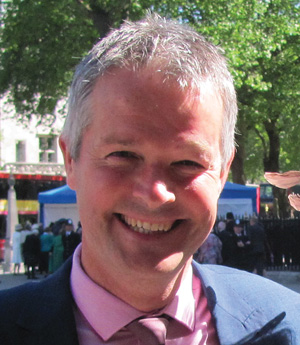The Vote with Frank Le Duc
Former Brighton and Hove police chief Graham Bartlett has been to Germany with the BBC to see whether drug consumption rooms offer any lessons

Brighton and Hove’s former police chief has been filmed in a “shooting gallery” used by drug addicts in Germany. It may sound like a tabloid headline but when Graham Bartlett visited drug consumption rooms in Frankfurt, it was with BBC documentary maker Glen Campbell. They went to find out whether the more liberal approach adopted there offered any lessons for dealing with the issue back home.
Brighton has been long been regarded as place with a drugs problem. And drugs laws in Britain have long been regarded as an imperfect solution by many. But it has proved hard for politicians, policy-makers and the media to have an open and honest debate about a sensitive subject. Opinions do not always divide easily along party political lines and the medical profession is far from united on how to proceed.
Mr Bartlett favours diverting drug users into treatment rather than punishing them. He has spoken about using law enforcement as a way of dealing with those who refuse help. His approach underpinned Operation Reduction which involved Sussex Police, local NHS staff and Brighton and Hove City Council working with others to try to tackle this issue. But others in policing take a harder line.
For some years Brighton and Hove was known as the drugs death capital of Britain. The mortality rate has come down but the problem hasn’t gone away. A report by the Independent Drugs Commission for Brighton and Hove in April last year said: “A study conducted in 2010 identified just over 2,000 heroin and cocaine users in the city who could be identified as problem drug users – ie, that they were dependent on one or more drugs or were experiencing health or social problems or were committing crimes related to their drug use.
“This figure does not include those experiencing problems with drugs other than heroin or cocaine. A total of 1,442 individuals attended treatment services in the city in the financial year 2011-12. The main problem drugs reported by this group were heroin, crack cocaine, powder cocaine, and cannabis.”
The report made a series of recommendations but the suggestion that policy-makers consider the use of drug consumption rooms was unsurprisingly the one that dominated the headlines. They are intended to be a safe space where addicts take drugs bought on the street. In Brighton there are already treatment centres where addicts are given opiates under medical supervision. Even this has proved controversial among some.
Mr Bartlett was one of the advisers to the commission. Last month he went with the BBC to find out how Frankfurt ended up with drug consumption rooms and to see whether they had helped. He said: “The problems in Brighton are not nearly as severe as they were in Frankfurt. And it’s been part of a long process in Frankfurt. I’m not saying that I support drug consumption rooms but they shouldn’t be dismissed as one part of a wider solution.
“Drug consumption rooms are the least worst place to take drugs and they give people an opportunity to be referred into treatment”
“If anyone thinks consumption rooms on their own can solve the problem, they’ve missed the point.” He picked up on the solution favoured by a fellow contributor the documentary, Andy Winter, chief executive of Brighton Housing Trust, who advocates abstinence programmes. Mr Bartlett said: “For those that are capable of it and are supported through it, abstinence is the best solution. But many aren’t able to go straight into an abstinence programme.”
He said that consumption rooms offered a clean and safe space and were better for children and others who didn’t use drugs by helping to prevent needles from littering parks and stairwells. He added: “I am not in favour of people taking drugs. I think that people who take drugs require treatment not punishment and that drug consumption rooms are the least worst place to take drugs and that they give people an opportunity to be referred into treatment programmes.”





















